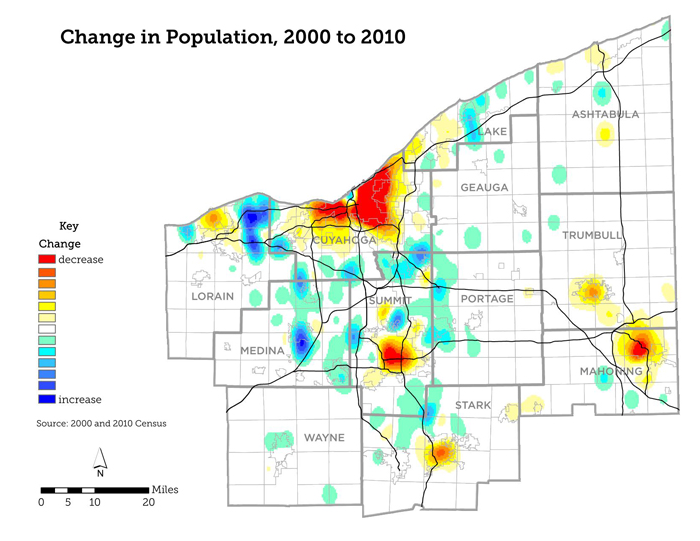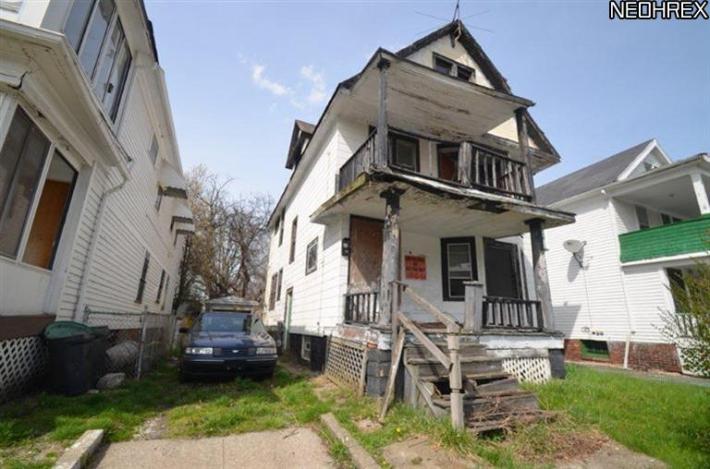
The Cleveland region has been struggling with sprawl for a long time.
Since the 1970s, the regional population has shrunk while housing and jobs have spread outward -- a combination that has devastated urban areas in particular.
Transportation policy is a big part of the problem. Northeast Ohio keeps widening highways, facilitating quick suburban commutes and fueling sprawl. This weakens the places that are already the most vulnerable. Cleveland recently topped a national list of "most distressed cities," and its neighbor East Cleveland is on the verge of bankruptcy.
Most Ohio governors and state transportation chiefs are oblivious or worse, pursuing policies that promote job sprawl, undermine transit, and lavish resources on highways.
One agency that could change this dynamic is the Northeast Ohio Areawide Coordinating Agency (NOACA), the regional planning agency charged with dispensing federal transportation funds. Until very recently, however, NOACA was not up to the task.
Sparsely populated rural counties have disproportionate influence at NOACA compared to dense urban areas, and rivalries within the agency often pitted low-income urban communities against newer, wealthy suburbs. In lieu of actual economic growth, many of the outlying suburbs were happy to simply siphon off businesses and houses from close-in communities.
Rather than confront this dysfunction, for years NOACA's leadership mostly shied away from it. Funding was awarded project-by-project to satisfy political demands, rather than to achieve specific policy goals like broad-based economic growth, better access to jobs, or environmental sustainability. In essence, the regional planning agency didn't do any planning, local environmental leader David Beach has said.
But now NOACA is trying to correct that, says the agency's new director, Grace Gallucci, who took the job in 2012 after working at Chicago's Regional Transportation Authority.

Following her arrival, the agency has been acting on the conclusions of a regional planning effort called the Northeast Ohio Sustainable Communities Consortium, or NEOSCC, funded by the Obama administration. NEOSCC determined that continuing with current development patterns would essentially be an unmitigated disaster, causing a downward spiral of vacancy and fiscal insolvency.
Last year the board of directors passed an "environmental justice policy" that allows less privileged communities to forego the "local match" for projects funded by NOACA. Previously, some communities didn't have enough money to even compete for NOACA projects. East Cleveland, for example, hasn't applied for NOACA funding for years because it couldn't afford to cover 20 percent of the project costs.
The big test of NOACA's commitment to reform is coming up with the development of its long-term plan, which is basically a list of projects the agency intends to fund. In the past, these plans would have been mechanisms for distributing pork -- a new interchange, for instance, and the construction jobs that go with it -- not blueprints for strengthening cities and towns with smart development and better transportation options.
Those days may be over. "We want it to be more of a visionary document," said Gallucci. "We’ll be engaging the public upfront and stakeholders, approaching it as a planning exercise that looks to developing the transportation system as a whole rather than a project-driven approach."
Gallucci said the emphasis will be on preserving existing infrastructure and better meeting the needs of people who don't own cars.
The goal is "to make sure we have a transportation system and network that works for everybody," she said. "Something that allows everyone to have access and to participate in the economy and the quality of life regardless of which mode of transportation they use."
Gallucci said NOACA already does a lot to support transit, relative to some agencies. But it could be doing a lot more. "If there is demand for transit, as there most likely will be based on millennials and based on the aging population... If there’s a deficiency, we will help bridge that gap," she said.
Conducting a robust public outreach process is a new approach for the agency. One of the criticisms of NOACA's former leadership was its insularity and lack of transparency. In the past, the board made decisions during weekday meetings. Hardly anyone in the region, including the press, understood what the organization did.
It's still very early on in the process, and NOACA hasn't made any concrete commitments yet. But Gallucci says the plan will be shaped by the comments the agency receives from the public.
"I think it’s going to be a big change," she said.





